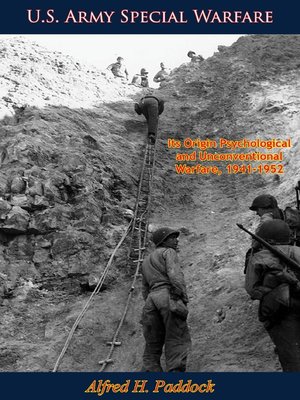U.S. Army Special Warfare Its Origin
ebook ∣ Psychological and Unconventional Warfare, 1941-1952
By Alfred H. Paddock

Sign up to save your library
With an OverDrive account, you can save your favorite libraries for at-a-glance information about availability. Find out more about OverDrive accounts.
Find this title in Libby, the library reading app by OverDrive.



Search for a digital library with this title
Title found at these libraries:
| Library Name | Distance |
|---|---|
| Loading... |
Colonel Paddock traces the origins of Army special warfare from 1941 to 1952, the year the Army's special warfare center was established. While the Army had experience in psychological warfare, the major recent U. S. experience in unconventional warfare had been in the Office of Strategic Services, a civilian agency, during World War II. Many army leaders, trained and experienced in conventional warfare, hesitantly accepted psychological warfare as a legitimate weapon in the Army's wartime arsenal, but questioned the validity and appropriateness of the Army's adoption of unconventional operations. The continuing tensions of the cold war and hostilities in Korea resolved the ambivalence in favor of coordinating in a single operation the techniques of both types of warfare. Colonel Paddocks extensively documented work traces a portion of a brief episode in our Nation's military history, but an instructive one. For the historian and military scholar, it provides the necessary backdrop for understanding the subsequent evolution of the Army's special warfare capability. For the national security policymaker, it suggests the value of the innovative impulse and the need for receptivity to new ideas and adaptability to change. John S. Pustay Lieutenant General, United States Air Force







